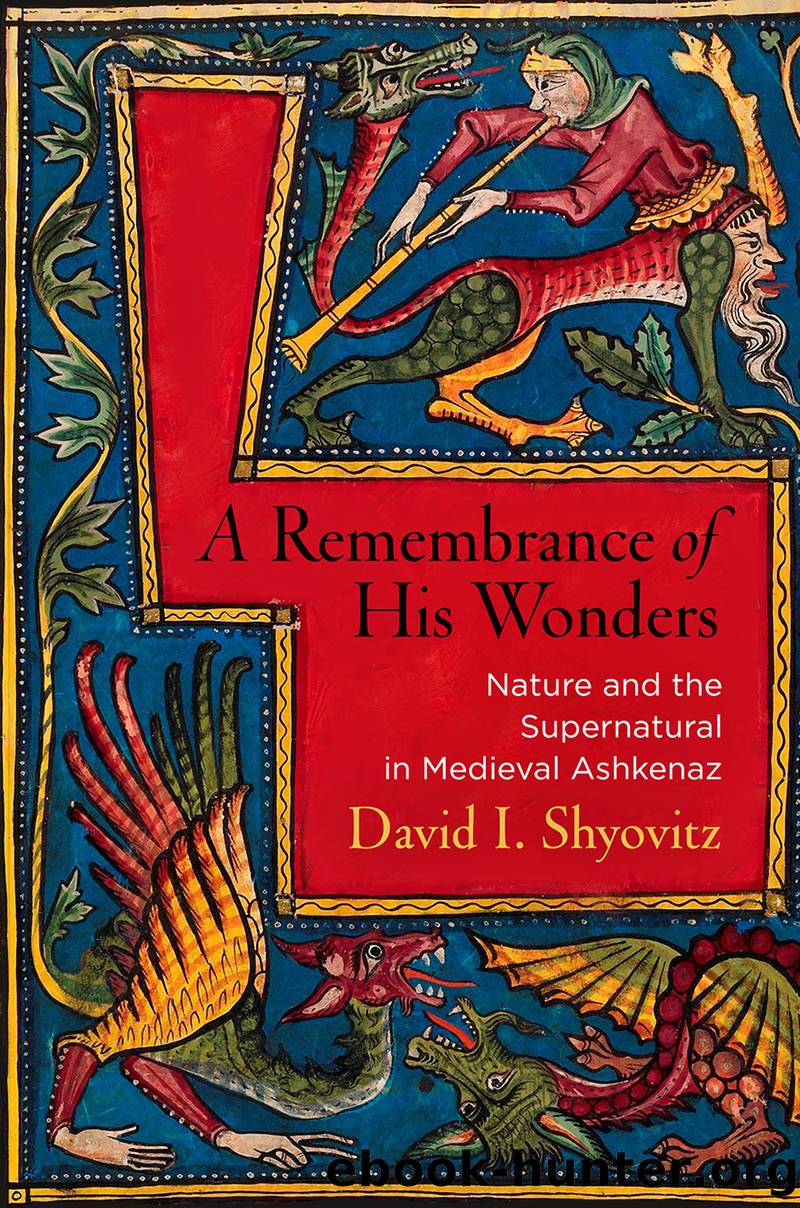A Remembrance of His Wonders by Shyovitz David I.;

Author:Shyovitz, David I.;
Language: eng
Format: epub
Publisher: Lightning Source Inc. (Tier 2)
Published: 2017-01-15T00:00:00+00:00
âIF HIS ORGAN BECOMES HARD, HE MUST NOT WRITE THE NAME OF GODâ
It was not only feces and urine that the Pietists saw as threatening to piety and holinessâSefer Hasidim contains myriad directives that seek to regulate spitting, nose blowing, vomiting, and, especially, seminal emissions as well. Moreover, while modern physiology would make fundamental distinctions between defecating and urinating on the one hand, and nasal discharge, vomiting, and ejaculation on the other, the Pietists saw all of these bodily byproducts as fundamentally similar and inextricably linked to excrement. In this, the Pietists reflected the typical Galenic understanding of excrement common in the high Middle Ages.55 Galen had posited that food, once consumed, underwent four digestions. In the first digestion, masticated food was further processed by the stomach into liquid chyle. The chyle then passed through the intestines in the second digestion; the intestines extracted useful nutrients from the chyle and sent them to the liver, where they were turned into blood. In the third digestion, the heart refines some of this blood and sends it to the arteries, and in the fourth, a small amount of heartâs blood is further refined into semen. Whatever is left over at the end of this process is eliminated from the body via urine and feces, but also in vomit, phlegm, and mucus.56 While semen is in a certain sense the culmination of the digestive process, it too was regarded as excrement, albeit a valuable one, since it could produce life.57
As such, the same strictures that we have seen the Pietists apply to urine and feces are invoked in discussions of these other effluences as well.58 Thus: âAfter reading from the Torah [in synagogue], one should kiss the scroll; and if he has to spit, he should do so and then kiss the Torah, but should not kiss the Torah and then spit.â59 Elsewhere, Sefer Hasidim gives detailed guidance concerning what points in the prayer service are appropriate for interrupting in order to spit or blow oneâs nose. It even cites approvingly the behavior of a certain Pietist, who made it a practice to stop and spit only at points in the liturgy where God is not being explicitly glorified.60 One must similarly be careful not to spit, or even sneeze, while writing a Torah scroll61âyet another instance in which the Pietists supersede rabbinic precedent, which considers sneezing in certain contexts to be a âsign of blessing.â62 All these prohibitions are identical to those emphasized by the Pietists in relation to feces and urine. Indeed, later halakhists, influenced by the Pietistic ideals, expanded these strictures even further.63
Vomiting receives conspicuous attention in Sefer Hasidim as well. Thus the reader is enjoined not to eat anything disgusting, which might cause one to have to vomit;64 and the specific prohibition that is invoked is that of al teshaktsuââyou shall not make yourself abominableâ (Lev. 11:43). As noted above, this is the very same verse that the rabbis had marshaled to prohibit one from praying when they needed to relieve themselves.
Download
This site does not store any files on its server. We only index and link to content provided by other sites. Please contact the content providers to delete copyright contents if any and email us, we'll remove relevant links or contents immediately.
| Haggadah | Hasidism |
| History | Holidays |
| Jewish Life | Kabbalah & Mysticism |
| Law | Movements |
| Prayerbooks | Sacred Writings |
| Sermons | Theology |
| Women & Judaism |
Man's Search for Meaning by Viktor E. Frankl(2266)
The Secret Power of Speaking God's Word by Joyce Meyer(2265)
Mckeown, Greg - Essentialism: The Disciplined Pursuit of Less by Mckeown Greg(2118)
MOSES THE EGYPTIAN by Jan Assmann(1983)
Unbound by Arlene Stein(1947)
Devil, The by Almond Philip C(1912)
The Complete Dead Sea Scrolls in English (7th Edition) (Penguin Classics) by Geza Vermes(1854)
I Capture the Castle by Dodie Smith(1582)
Schindler's Ark by Thomas Keneally(1522)
The Invisible Wall by Harry Bernstein(1464)
The Gnostic Gospel of St. Thomas by Tau Malachi(1418)
The Bible Doesn't Say That by Dr. Joel M. Hoffman(1376)
The Secret Doctrine of the Kabbalah by Leonora Leet(1273)
The Jewish State by Theodor Herzl(1258)
The Book of Separation by Tova Mirvis(1229)
A History of the Jews by Max I. Dimont(1214)
The Dead Sea Scrolls Bible by Martin G. Abegg(1210)
Political Theology by Carl Schmitt(1193)
Oy!: The Ultimate Book of Jewish Jokes by David Minkoff(1108)
